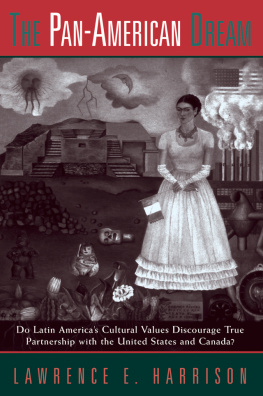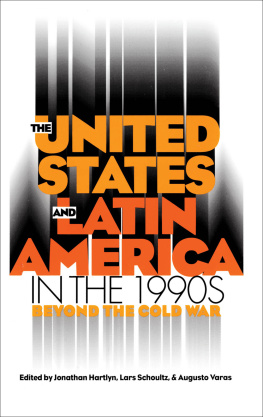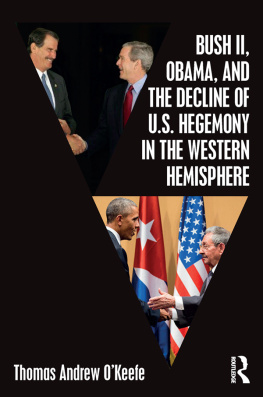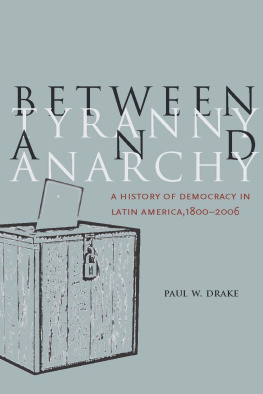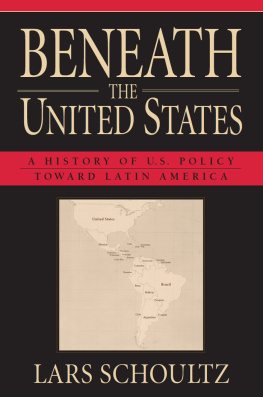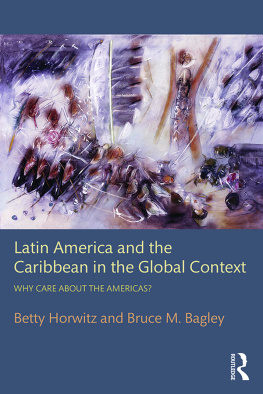The Pan-American Dream
The Pan-American Dream
Do Latin America's Cultural Values Discourage True Partnership with the United States and Canada?
Lawrence E. Harrison
Grateful acknowledgment is made for permission to reprint the following:
The table on page 88 from El Sueo Pan-Americano by Francisco Andrs Orizo. Copyright 1991 by Francisco Andrs Orizo. Reprinted by permission of the author. Excerpts from "The United Fruit Co." by Pablo Neruda. Copyright 1991 by Fundacion Pablo Neruda, Regents of the University of California. From Canto General, edited and translated by Jack Schmitt. Reprinted by permission of the University of California Press.
First published 1997 by Westview Press
Published 2018 by Routledge
711 Third Avenue, New York, NY 10017, USA
2 Park Square, Milton Park, Abingdon, Oxon OX14 4RN
Routledge is an imprint of the Taylor & Francis Group, an informa business
Copyright 1997 Lawrence E. Harrison
All rights reserved. No part of this book may be reprinted or reproduced or utilised in any form or by any electronic, mechanical, or other means, now known or hereafter invented, including photocopying and recording, or in any information storage or retrieval system, without permission in writing from the publishers.
Notice:
Product or corporate names may be trademarks or registered trademarks, and are used only for identification and explanation without intent to infringe.
Designed by Nancy Sabato
Library of Congress Cataloging-in-Publication Data
Harrison, Lawrence E.
The Pan-American dream : do Latin America's cultural values discourage true partnership with the United States and Canada? / by Lawrence E. Harrison.
p. cm.
Includes index.
ISBN 0-465-08916-X (hc) ISBN 0-8133-3470-5 (pb)
1. Pan-Americanism. 2. Latin AmericaRelationsUnited States. 3. United StatesRelationsLatin America. 4. Latin AmericaRelationsCanada. 5. CanadaRelationsLatin America. 6. ValuesAmerica. 7. Free tradeAmerica.
I. Title.
F1410.H26 1997
303.48'27308dc20
9624670
CIP
ISBN 13: 978-0-8133-3470-7 (pbk)
In memory of Carlos Rangel
To whose wisdom and courage we are all indebted.
I wish to express my gratitude to the Scaife Family Foundation for its support, also the Center for Internati anal Affairs at Harvard University with which I was associated (for the third time) while working on this book. I wish to thank Kermit Hummel, publisher of Basic Books, for his encouragement and support, and the copy editor, Linda Carbone, for her unfailing good judgment and advice.
I also wish to acknowledge a number of people who provided me with helpful reactions and suggestions: Maria Lucia Victor Barbosa, Rodrigo Botero, Leon Bouvier, Charles Brayshaw, Marshall Brown, Shirley Christian, Isaac Cohen, Carlos Escud, Mark Falcoff, Patricia Galeana, Mariano Grondona, Eileen Heaphy, Philip Heymann, David Hojman, Martin Hopenheyn, Anthony Interlandi, Mark Krikorian, Lynne Lambert, Lawrence Lederman, Ozay Mehmet, Carlos Alberto Montaner, Luis Pasos, Jos Osvaldo de Meira Penna, Michel Riel, Sharon Stanton Russell, George Scialabba, Peter Skerry, James Walsh, Sidney Weintraub, and Arthur Wortzel.
Finally, I wish to express my gratitude to my wife, Patricia Crane Harrison, for her patience, support, and innumerable helpful suggestions.
Dream or Reality?
On 11 December 1994, in Miami, the Partnership for Development and Prosperity was signed by thirty-four Western Hemisphere chiefs of state, including President Bill Clinton, Prime Minister Jean Chrtien of Canada, Presidents Ernesto Zedillo of Mexico, Carlos Sal Menem of Argentina, and Eduardo Frei of Chile, and President-elect Fernando Henrique Cardoso of Brazil. Among the goals of the Miami summit was the negotiation of a Free Trade Area of the Americas within ten years. The rhetoric of the meeting repeatedly evoked the impressive progress of Western European integration since World War II.
Thirty-three years earlier, on 17 August 1961, in Uruguay, President John F, Kennedy and the Latin American chiefs of state had signed tlie Charter of Punta del Este, which inaugurated the Alliance for Progress, "established on the basic principle that free men working through the institution of representative democracy can best satisfy man's aspirations ... for work, home and land, health and schools." Latin America was to be transformedand immunized against infection from the Cuban Revolutionwithin ten years. But ten years later, the Alliance had lost its way in a rash of military takeovers of elected governments.
Is the Partnership for Development and Prosperitythe successor to the Enterprise for the Americas Initiative George Bush announced in 1990destined to follow the Alliance for Progress, Franklin Roosevelt's Good Neighbor Policy, and a number of less-known hemispheric initiatives, into the cemetery of frustrated good intentions, of Pan-American dreams? Can a coherent, functional, durable community that will transform the dream into reality be constructed with building blocks so different: to the north, the United States and Canada, prosperous First World countries with centuries-old democratic institutions; to the south, Latin America's poor Third World countries, whose centuries-old political traditions and institutions are for the most part authoritarian and which, in most cases, are today experimenting with democratic institutions and free-market economic policies for the first time? Why are the United States and Canada so different from, so far ahead of, Latin America? Why has it taken so long for Latin America to conclude that democratic capitalism and intimate, open relationships with the United States are in its own best interests? Finally, what might be done to enhance the prospects for a genuine, dynamic community in the Hemisphere?
Those are the questions I shall try to answer in this book.
I visited Washington in January 1995, a few weeks after the Miami summit, to talk to U.S. government policy makers about the prospects for the Western Hemisphere. The incipient Mexican crisis notwithstanding, they were uniformly euphoric about the unanimity achieved at the summit and convinced that a new day had dawned for relations within the Hemisphere. And surely there were some important differences from the Alliance years: freely elected governments were in power everywhere except in Cuba and, less obviously, Mexico (although only in Costa Rica, Chile, and Uruguay did democracy go much beyond electoral forms). Latin American intellectuals and politicians who had spent most of the post-World War II period blaming the United States, "dependency," and "imperialism" for Latin America's problems were increasingly convinced that their problems were home-grownand that their well-being depended heavily on intimate political and economic relations with the United States. And virtually all Latin American governments were pursuing free-market, internationally oriented economic policies after decades of statist or socialist experimentation and import substitution policies that avoided the "exploitation" of the world market.
The optimism of my State Department and National Security Council interlocutors reflected the new Latin American politics and economics. But the officials also repeatedly referred to the new wave of Latin American leaders, many of them educated in prestigious U.S. universities and "world-class" professionals. Frequently mentioned were Carlos Salinas de Gortari, the former Mexican president and architect of the North American Free Trade Agreement (NAFTA), who had done graduate work at Harvard; and Alberto Dahik, the vice president of Ecuador, who had studied at Princeton and was engaged in a campaign to promote transparency in government.

